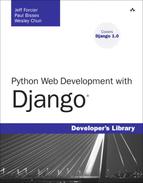Django is not just a Web framework. It’s not just a great design and 50,000 lines of code. It’s also a community of coders, testers, translators, question-answerers, and a global collective of volunteers. The Django AUTHORS file lists more than 200 contributors, and there are many, many others who contribute in large and small ways to keep the project going.
Django is an exemplary open source project—Python creator Guido van Rossum has said as much—and among other things that means it offers many ways for interested people to get involved. It’s likely that, like many others, you find Django makes your life as a Web developer easier and more fun, and you may find your incredible surplus of leisure and happiness inspires you to give something back. Next are some examples of contributions you could make.
The easiest ways to contribute don’t even require any programming whatsoever:
Submit a correction for a typo you found in the documentation
Help answer newbie questions on the IRC channel or the django-users mailing list
Help with ticket triage at code.djangoproject.com, closing invalid tickets and clarifying (or verifying) valid ones
If you’re willing to get your hands a little dirty, then there are options involving actual code that still don’t require Herculean effort:
Submit a patch that fixes a known bug
Run Django’s test suite on a less popular system or an unusual (but supported) software configuration to help identify potential problems
Join work on a “branch” of Django where new features are being developed
Finally, speaking of Herculean effort, these tasks would have a significant impact on the Django community:
Perform Django localization for a language that hasn’t been done yet (if you can find one!)
Find a feature that is widely considered desirable but hasn’t been implemented, and implement it
Create a high-quality application based on Django and release it as open source
If you’re unsure, an easy way to test the waters without commitment is to join the django-users or django-developers mailing lists or spend some time in the #django IRC channel at irc.freenode.net. Before long you may find yourself contributing as well. And if you see one of us there, say hello!
Note
The Django documentation (see the official site or withdjango.com for a pointer) covers the details of contributing in great detail from coding style to mailing list protocol.
Aside from joining the mailing lists and/or the IRC channel, another way to establish yourself in the Django ecosystem is to register yourself at http://djangopeople.net, a worldwide directory of Django developers (which can also be used to find other developers if you’re interested in forming a team project). Another site attempting to pair up developers with those trying to hire them is http://djangogigs.com, which also has its own developer listing (http://djangogigs.com/developers/).
Finally, you want to make sure you subscribe to the official Django blog aggregator, which can be a great way to get news on what’s going on in the world of Django development. The aggregator, along with plenty of links to other community tools, can be found at http://djangoproject.com/community/.
